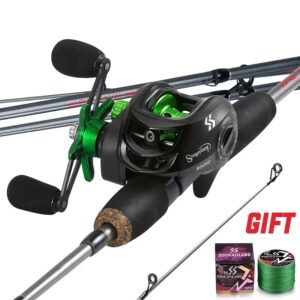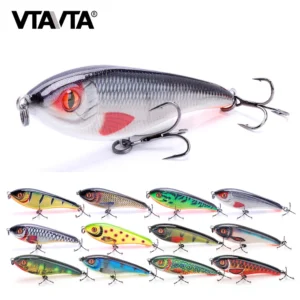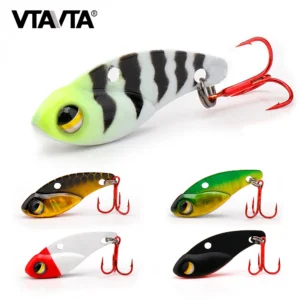Fishing Therapy for Veterans: How Angling Helps Manage PTSD & Depression
“The water doesn’t care about your rank, your trauma, or your scars. It just asks you to be present.” — A Vietnam veteran’s reflection on fishing
-
1.7m Green Carbon Fiber Casting Rod and Baitcasting Reel
$172.00 – $173.20Price range: $172.00 through $173.20
$120.40 – $121.24Price range: $120.40 through $121.24 -
1.7m Yellow Carbon Fiber Casting Rod and Baitcasting Reel
$173.50 – $173.70Price range: $173.50 through $173.70
$121.45 – $121.59Price range: $121.45 through $121.59
The Healing Power of Water
For many combat veterans, the war doesn’t end when they come home. PTSD (Post-Traumatic Stress Disorder), depression, and anxiety often linger, making civilian life feel like another battlefield. But an unexpected ally has emerged in the fight for mental wellness: fishing.
Across the U.S., programs like Project Healing Waters, Heroes on the Water, and Wounded Warriors in Action are reporting remarkable success using angling as therapy. Veterans struggling with insomnia, hypervigilance, and emotional numbness are finding solace in the rhythmic cast of a line, the patience of waiting, and the thrill of the catch.
In this deep dive, we’ll explore:
The science behind fishing as therapy for PTSD and depression
Firsthand accounts from veterans whose lives were changed by angling
How to get involved with veteran fishing programs nationwide
Essential gear for therapeutic fishing trips
Why Fishing Works: The Science of Solitude and Success
1. The Calming Effect of Blue Spaces
Research shows that being near water (“blue spaces”) lowers cortisol levels, the hormone linked to stress. For veterans with PTSD, the simple act of sitting by a lake or river can:
Slow racing thoughts
Reduce “fight or flight” responses
Improve sleep patterns disrupted by nightmares
2. The Meditation of Repetition
Casting a line isn’t just a physical act—it’s a moving meditation. The repetitive motion:
Anchors the mind in the present (a core principle of mindfulness-based PTSD treatment)
Creates a sensory focus (the sound of the reel, the tug of the current) that crowds out intrusive memories
3. The Confidence Boost of Mastery
Learning new skills (like fly-tying or reading water currents) rebuilds the sense of competence that military service fosters. Catching a fish—no matter the size—delivers a tangible win, something many veterans crave after feeling “stuck” in civilian life.
Voices from the Water: Veterans’ Stories
“I Stopped Counting Dead Friends When I Started Counting Fish”
Mike R., Army Ranger (2 tours in Afghanistan)
*”After my medical discharge, I’d sit in my garage cleaning my Glock over and over. My wife found Heroes on the Water. That first kayak trip, I caught a 4-pound bass. For the first time in years, I wasn’t thinking about IEDs or my buddies who didn’t make it. I was just… a guy catching a fish.”*
How Fly Fishing Broke the Isolation
Sarah K., Navy Corpsman (Iraq War veteran)
“PTSD made me push everyone away. At a Project Healing Waters event, I met other vets who just got it. We didn’t need to talk about the war. We talked about mayfly hatches and drag settings. That shared focus was the bridge back to human connection.”
Getting Involved: Veteran Fishing Programs You Can Join Today
1. Project Healing Waters Fly Fishing (PHWFF)
What they offer: Free fly-fishing instruction, gear, and outings
Eligibility: All disabled veterans (combat or non-combat related)
Hot tip: Many PHWFF chapters partner with Orvis for discounted gear
2. Heroes on the Water (HOW)
Specialty: Kayak fishing excursions
Why it works: The added challenge of balancing a kayak forces hyperfocus, crowding out anxiety
Keyword-rich link: “Find a HOW chapter near me”
3. Wounded Warriors in Action (WWIA)
Unique angle: Guided hunting and fishing trips with fellow Purple Heart recipients
Notable perk: All-expenses-paid adventures
Gear Up: Essential Fishing Equipment for Therapeutic Outings
Budget-Friendly Starter Kit ($150 or Less)
Rod/Reel Combo: Ugly Stik GX2 (indestructible—perfect for beginners)
Tackle: Pre-made “veteran therapy packs” from Bass Pro Shops (includes PTSD-bright lures for easy tracking)
Apparel: Moisture-wicking shirts (helps manage anxiety-induced sweating)
Pro-Level Upgrades for Regular Anglers
Noise-canceling waders: Simms Freestone Z (blocks sudden sounds that may trigger startle responses)
Polarized sunglasses: Costa Del Mar (reduces glare-induced eye strain—common in medicated vets)
The Ripple Effect: How Fishing Reconnects Veterans to Themselves
Beyond symptom relief, fishing offers:
A new identity: From “broken veteran” to “angler”
A reason to travel: Many vets report planning fishing trips gives them purpose
Family bonding: Spouses/kids often join, repairing relationships strained by PTSD
Casting Forward: Your Next Steps
If you’re a veteran (or love one), try this today:
Google “[your state] + veteran fishing program”
Visit a local bait shop—many offer veteran discounts and know about informal groups
Start small: Even 30 minutes at a neighborhood pond counts
The water’s waiting. The fish are biting. And maybe—just maybe—the heaviness in your chest will feel a little lighter with each cast.




